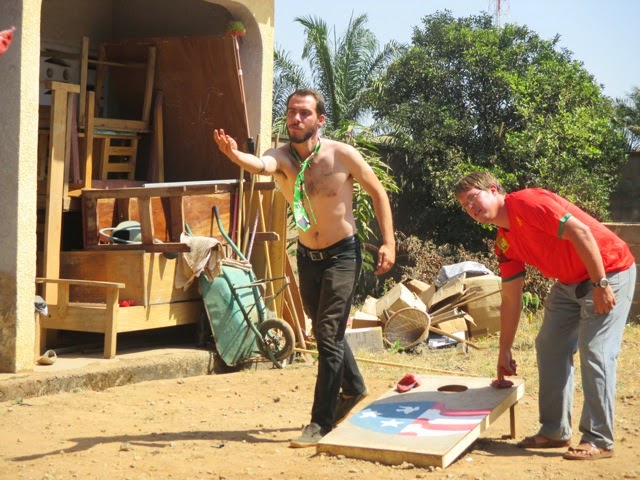Christmas
caught me off guard this year. With no television to broadcast incessant
advertisements and no radio to bombard me with nonstop Christmas music, it wasn’t
until mid-December that I was reminded: ‘Twas the season. In the Anglophone
city of Bamenda, sitting down to dinner in a brightly colored restaurant that
specialized in fufu corn and jama-jama (cooked huckleberry leaves), I noticed a small imitation evergreen
in the corner of the restaurant and realized that the cheesy muzak playing
overhead was an ‘80s-tastic rendition of “Angels We Have Heard On High.” Maybe
because I’ve never spent Christmas in the tropics before, I was slightly
baffled.
I
met a third-year volunteer a few months ago who told me that a PCV has three
options when it comes to Christmas: spend it in village; spend it with other
volunteers; or fly home to spend it with family. Since my friends in Nyambaka
are Muslim and I thought it dangerous to return to the comforting,
climate-controlled United States so early in my service, I was left with one
option, and I have no regrets regarding my decision.
I
constantly tell people that one thing Peace Corps teaches an individual is how
to improvise, and Christmas Day is a perfect example. In a country that has
probably never heard of mistletoe or eggnog, both of these things magically
materialized thanks to volunteers’ knack for invention. Christmas morning was
spent eating gargantuan homemade cinnamon rolls and watching the classic
claymation version of “Rudolph the Red-Nosed Reindeer.” As for my own
improvisations, in an attempt to look somewhat presentable, I wore a dress from
“up for grabs,” which is basically a metal trunk that serves as a sort of Peace
Corps thrift shop.
Not too shabby, right?
While
the other volunteers feasted on macaroni and cheese, mashed potatoes, and other
American staples, I took a motorcycle taxi to the home of my counterpart, the
censeur (vice principal) of the Nyambaka high school. It was the first time I
met his wife and three adorable children, and as we got to know one another in
a lovely mix of French and English conversation, we dined on papaya salad,
fried plantains, and ndolé (bitter leaves cooked with fish). In a good show of
African hospitality I was presented with far too much food, and as a good
guest, I ate as much as physically possible, which wasn’t that much,
considering I’d been to the hospital the previous day complaining of stomach
pains, diarrhea, and loss of appetite. (I can say with some certainty that the
Ngaoundere hospital will not live on in my memory as a favorite Christmas Eve.)
I would have loved to stay in Roger and Aurelie’s salon talking about our
families and listening to hymns on the radio, but I had to be back at the Peace
Corps house for my shift.
Yes,
after much discussion and innumerable complaints about video quality when a
dozen people are using the same internet connection, someone had the bright
idea to assign shifts for when people could talk to their families. Initially,
I hemmed and hawed about not having an ideal time, but it was certainly worth
it to see my dad and his husband, and my entire maternal family. Although I
don’t ascribe to a particular faith, Christmas is probably my favorite holiday,
since it gives me an excuse to shower the people I love with gifts, and I
savored my two hours Skype since I could watch their reactions to opening
presents.
Of
course, Christmas is a time for traditions, and my first Volunteer Christmas
was no exception, bringing with it traditions old and new. The tried and true
volunteer favorite of the bean bag toss (called “corn hole” by some) led to a
number of heated exchanges as the number of empty beer bottles increased and
the number of shirts worn diminished. But as the sun set on the playing field
and the sounds of Marvin Gaye’s “Mercy Mercy Me” wafted over us, someone said,
“What about karaoke?”
Alex and Drew represent Team Shirtless.
And
thus was born Yowaoke. In Fulfulde, “yowah” is something of a catchall term
which can express anything from agreement to surprise, and has become a
favorite exclamation of a number of volunteers. Since there are no karaoke bars
in Ngaoundere (that we know of, anyway), we set up our own, loading YouTube
lyric videos on a laptop. We had no microphones, so we depended on our own
larynxes as our sound system. (As a result, most participants were a bit hoarse
the next morning.) And since we had no charismatic karaoke host, I ran around
with a sheet of printer paper and a ballpoint pen and scribbled people’s
requests. So it was that karaoke took on a distinctly improvised Cameroonian
flavor and became Yowaoke. A great deal of fun was had, and subsequent Yowaoke
soirees are in the works.
I
had worried for a brief moment that Christmas in Cameroon would be something of
a disappointment. It doesn’t feel like the holidays without snow, I heard one
person say. It just isn’t the same without my family, said another.
And
that person was right. It wasn’t the same. But it was just as good.































